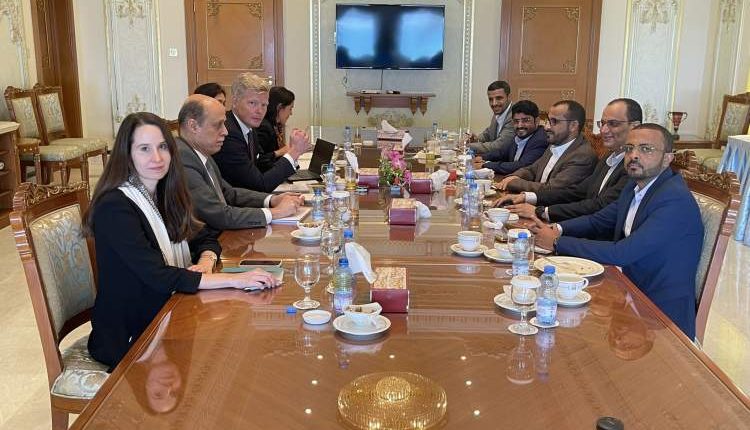Truce Is Not Important If Does not Alleviate Suffering of Citizens
The Acting Chairman of the Supreme Economic Committee, Hashem Ismail, participated in the meeting held yesterday in the Omani capital, Muscat, with the UN envoy to Yemen, Hans Grundberg, headed by the head of National Delegation, Mohammed Abdulsalam. During the meeting, in the presence of the Chairman of the Military Committee, Yahya Al-Razami, they discussed the course of truce, the obstacles it faced, and the need to pay the salaries of state employees.
Ismail indicated that the initiative of the Supreme Political Council to open a special account for salaries in the Central Bank branch in Hodeidah, and to deposit the revenues of oil fuel ships to it, has been in place since 2020.
He stressed that despite the scarcity of revenues, depositing them continues by Sana’a, including the revenues of the ships that entered under the truce, and are used to disburse half a salary from time to time.
Ismail reiterated his readiness to coordinate any mechanisms that guarantee ending the suffering of employees and retirees in all governorates, and disbursing their salaries on a regular basis.
He touched on the monthly revenues of oil looted by the Saudi-backed government, which amount to approximately 260 million dollars per month, noting that despite these revenues, salaries of employees in the occupied governorates are not paid on a regular basis.
He also stressed that there is no point in any truce that does not serve the citizens, and does not contribute to alleviating their suffering caused by the US-Saudi aggression, the siege, and the economic war that targets all the Yemeni people.
The UN envoy stressed that the issue of state employees’ salaries will be a top priority that will be worked on.
Last Saturday, the UN envoy submitted a proposal to gradually open roads, ensuring an implementation mechanism and guarantees for the safety of civilian travelers. He called on the two parties to “conclude their internal deliberations urgently and achieve positive results for the Yemeni people.”
Grundberg stressed that “the importance of lifting restrictions on the freedom of movement of people and goods is not limited to the positive impact of alleviating the suffering of Yemenis and reviving their economy, but will also help enhance confidence in the political process.”
On Monday, President Mahdi Al-Mashat affirmed that if the military negotiating committee in Jordan does not see new signs regarding closed roads to alleviate suffering of Yemeni people, the committee will announce a unilateral initiative.
He added that the US-Saudi aggression is sparing no effort to exploit the suffering of the citizens in Taiz governorate, explaining that there is a varying agenda of the Saudi-backed government that uses the suffering and difficult conditions in Taiz and the various governorates.
Mashat also pointed out that port of Hodeidah revenues are allocated in favor of state employees’ salary so that forces of US-Saudi aggression cover the deficit from oil and gas revenues. He stressed that the US-Saudi aggression and its mercenaries must fulfill their obligations towards the deficit in covering the salaries of state employees as it has been agreed to.
In early April, the UN special envoy for Yemen, Hans Grundberg, announced the nationwide ceasefire, for the first time since 2016, saying the two-month truce would be eligible for renewal with the consent of parties. The truce meant to halt all military operations in the country and to bring the foreign military invasion to an end.
UN Secretary-General Antonio Guterres said the truce “must be a first step to ending Yemen’s devastating war,” urging the warring parties to build on the opportunity to “resume an inclusive and comprehensive Yemeni political process.”

